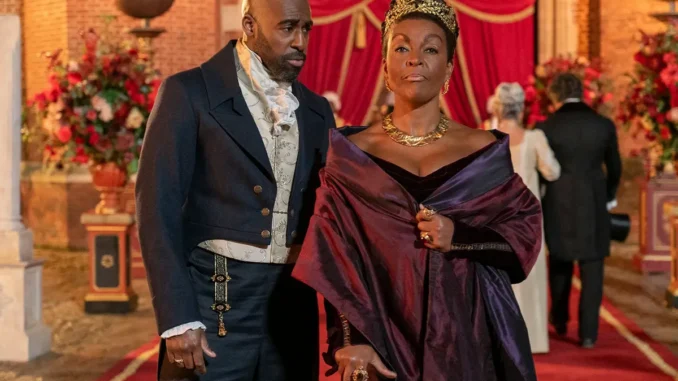
The beloved actor discusses Lady Danbury being “rattled,” where she can go next and the power of wielding that cane
Since this was my first time speaking with Adjoa Andoh, the “Bridgerton” actor who makes Lady Agatha Danbury a force second only to Queen Charlotte (Golda Rosheuvel) in formidability, I begged her pardon before asking about her character’s other defining trait: her outstanding fashion.
In 19th century Grosvenor Square, and in a sea of effervescent pastels and ruffles, Lady Danbury is a vision in saturated plums and burgundies sculpted by lines and high collars that could slice brie. The Queen has her artistic pompadours and diadems; Lady Danbury crowns herself with her signature hat, worn at a jaunty tilt. In Julia Quinn’s novels, the character walks with a cane. Andoh’s interpretation of that accessory implies anything but infirmity.
“For my iteration of Lady Danbury,” Andoh shared in a recent Zoom conversation, “it is a stick that has swagger.”
Each new “Bridgerton” season redirects its focus to another of the titular family’s children, inviting us to tag along as they seek a suitable match that balances social politics and romance. While the circumstances of each courtship shift with each character, Lady Danbury is a regal constant. A loyal friend to the family’s matriarch Violet Bridgerton (Ruth Gemmell) and one of the queen’s most trusted confidantes, Lady Danbury is a character – bolstered by Andoh’s performance – one aspires to know and, maybe, to become.
Smitten viewers may hope that she remains ever thus. Not Andoh. “To me, that’s not interesting . . . it’s not life,” she said,”because none of us are in aspic. It’s almost like the fiction of the magical Negro. It doesn’t exist because we’re humans. We’re not gods or monoliths. I don’t want to watch that. And I don’t want to play that. I want to play someone who has to navigate life like we all do, because there’s learning in it, and there’s drama in it, and there’s interest in it.”
In the latest “Bridgerton” storyline Lady Danbury’s calm is unexpectedly rattled by the unannounced arrival of her long-absent brother, Lord Marcus Anderson (Daniel Francis). For most of the season we don’t know why Lady Danbury had a falling out with her brother, but discover the truth in the seventh episode, “Joining of Hands.”
When they were children Marcus ruined Agatha’s plans to escape her family, resulting in her father marrying her off to an older man she couldn’t stand. This is where her story picks up in “Queen Charlotte,” where the character’s younger version is played by Arsema Thomas.
Regarding this new revelation, Andoh says, “OK, so here’s where Adjoa goes into a bit of a heavy turn. But you know, I have been thinking about D-Day, and the 80th anniversary of the war, and all the different people who had the most awful hardships in their lives, who don’t want to discuss it. . . . I know we’re talking about fiction. We’re not talking about real life, terrible war experiences. Nonetheless, I reflect on those stories, and I reflect on grandparents who never talked about their wartime experiences and other experiences.
“Her brother and all of that childhood, she never talks about it,” Andoh continued. “She never raises it. Why? It was painful, and it was hard, and she is trying to move forward. So I think when you say she’s rattled when he appears, you are right. Because he’s rattling the edifice that she has created in order to go forward, in a way that she finds comfortable and one she can manage. And for me . . . a character rattled? A formidable person off their game? It’s fabulous to play.”
In addition to her extensive activism work, Andoh’s career spans decades and includes credits on long-running U.K. TV series such as “EastEnders,” “Casualty” and “Doctor Who” along with an extensive list of theatrical roles, including directing and starring in a production of William Shakespeare’s “Richard III.” (Elsewhere on Netflix, she also pops up in Season 2 of “The Witcher.”)
“Bridgerton,” however, brings together a vast community from different countries and cultures, all linked by an affinity for romance and the story’s inclusive interpretation of Regency-era storytelling. Which, as Andoh points out, is closer to the truth of how Britain was and is.
Shonda Rhimes’ interpretation of that period, as shaped by creator Chris Van Dusen, who handed the showrunner reins over to Jess Brownell for this new season, is a refreshing response to those of us who grew up watching all-white period productions on PBS, courtesy of “Masterpiece Theater.”
